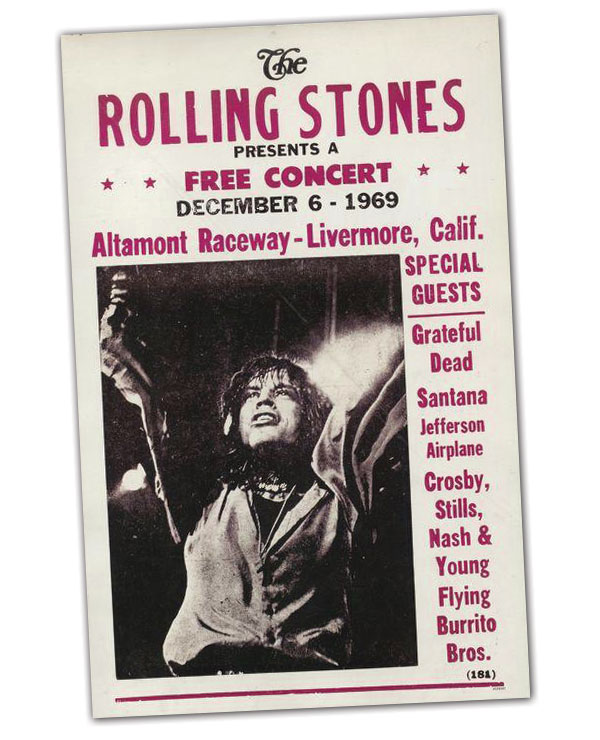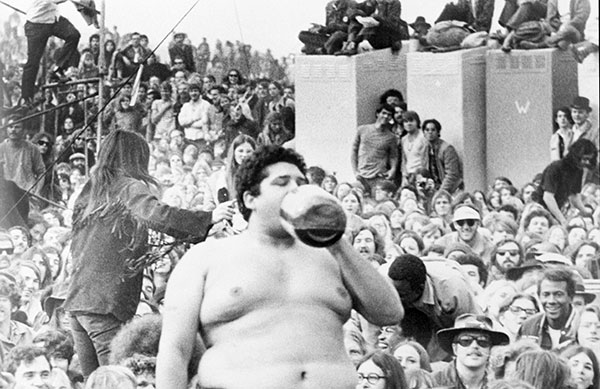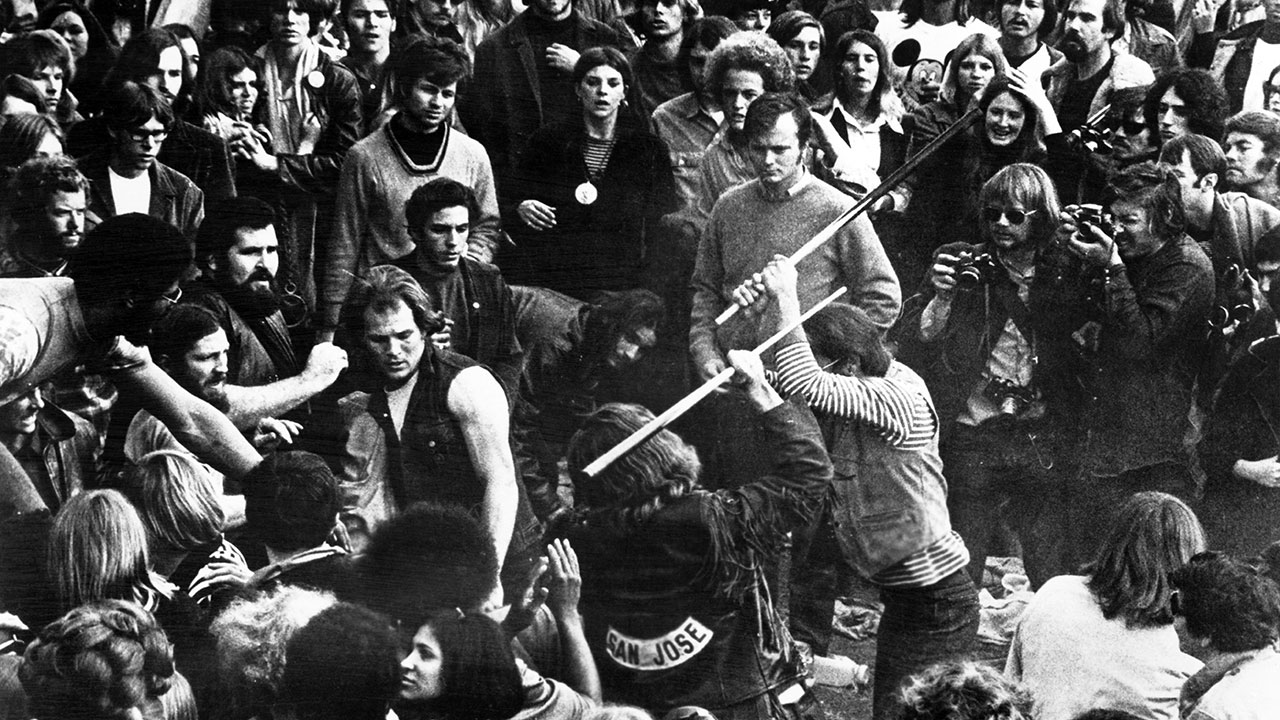It was supposed to be the West Coast's answer to Woodstock, but a perfect storm of negativity and naiveté saw the Rolling Stones Altamont show of December 6th, 1969 forever defined as the day the U.S. counterculture's utopian hippie dream died.
The initial germ of an idea came from Jefferson Airplane's Spencer Dryden and Jorma Kaukonen whose original plan was to bring The Beatles to San Francisco “to experience what we're experiencing” and to play a free concert alongside the Grateful Dead in Golden Gate Park.
Following news of the Beatles' split, the Rolling Stones agreed to headline (at the conclusion of an American tour widely criticised for its high ticket prices). The Stones had commissioned documentary filmmakers Albert and David Maysles to cover their '69 tour and the giant Frisco show promised to provide the perfect conclusion to their movie (ultimately released in 1970 as Gimme Shelter). But things didn't quite go to plan.
Two days before the show was due to proceed negotiations between representatives of the love generation, City Hall and the Police Department collapsed. Golden Gate Park was off the table. Sonoma's Sears Point Raceway was put forward as a last minute alternative but, sniffing desperation on the organiser's part, its owners demanded a $100,000 bond from the Stones. Finally, at the eleventh hour, Altamont Speedway was offered.
It was in the Californian desert, onsite toilet and medical facilities were decidedly sparse. Doctors and psychiatrists were available, but with an attending community estimated to be as high as 500,000 souls (and all expected to be as high as tripped-out kites), nowhere near sufficient. Extra supplies of anti-psychotic drug Thorazine were flown in from local hospitals. Meanwhile, the Stones (on the advice of the Grateful Dead) decided to hire the Hells Angels as security. What could possibly go wrong?
Quite a lot, actually.

By most accounts, including their own, the Angels accepted 500 dollars worth of beer (supplied to them by Stones road manager Sam Cutler) to mind the stage.
“We don't police things, we're not a security force,” the Angels' Sweet William Fritsch reportedly told Cutler. While Sonny Barger's understanding of the Angels' role was to sit on the stage effectively intimidating the crowd into abject obedience. But... Well, $500 bought a lot of beer in '69, and the Hells Angels, many of whom were also quenching their not insignificant thirsts with acid-laced Electric Kool-Aid, aren't exactly renowned for their patience, sobriety, tolerance and mild manner.
Altamont didn't happen in a vacuum. A dark vibe had already fallen over California's 'Love Generation' in the wake of August '69's Tate-LaBianca murders (perpetrated by Charles Manson's 'Family'). The hippies' house of cards was already starting to tumble and behind their blissed-out peyote smiles they knew it.
Manson may have broken the spell, but the two-year period between '67 and '69 wasn't all flowers in hair and universal tolerance. The hippies existed in tandem with an escalating war in Vietnam, the assassinations of Robert Kennedy and Martin Luther King and violence on the streets of Chicago, Detroit and Paris. Meanwhile, on the psychoactive front, homegrown stems 'n' seeds and Owsley's acid were steadily being replaced as the Haight's drug du jour by methedrine and smack.
Clouds gathered and the perfect storm broke over Altamont.

As Saturday 6th dawned conditions in the desert were grim. Freezing, in fact. There were six mile tail-backs, cars were abandoned, Thunderbird and Ripple wine washed back toxic yellow tabs of bad-trip guaranteeing 'organic' acid for breakfast, and a mood of trepidation filled the air. At 1pm, bang on three hours late, Santana took to the stage as three people were beaten-up by Hells Angels with sawn-off pool cues, to a psychedelic samba rhythm.
“The fights started because the Hells Angels were pushing people around,” remembered Carlos Santana. Three songs into his band's set, forty Angels had mounted the meter-high stage carrying cases of beer. With security like this, who needs stage invaders?
Following another interminable wait, Jefferson Airplane suffer an even worse ordeal than Santana. Many of the Angels had driven roughshod through the crowd and parked their Harleys right next to the stage. Inevitably, in the crush one of the bikes was toppled, cue pandemonium. The Airplane's Marty Balin decided to intervene and was knocked out cold by one of the Angels. Bassist Jack Casady voiced his displeasure over the microphone and following a 'scuffle' the only Jefferson left standing was Grace Slick...
“To experience what we're experiencing”, eh? Thanks, but no thanks.

Having heartily recommended the Hells Angels' services, The Grateful Dead – scheduled to take the stage following the (next-up) Flying Burrito Brothers, who miraculously escaped injury, possibly due to their Angel-friendly country rock - had it away on their toes.
Incredibly, not a single one of Crosby, Stills, Nash & Young were slaughtered by bikers as they closely harmonised, to the percussive accompaniment of skulls fracturing under pool cues, prior to the arrival of the Rolling Stones.
Up until now, the Rolling Stones had been cultivating an image of being something of a dangerous band, the ultimate Dionysian quintet. Diabolic, even. The prospect of using the Hells Angels, resplendent in their colours, as cred-grabbing, set dressing in the Maysles brothers' up-coming movie (demonic stormtroopers flanking Jagger's Lucifer), probably seemed too good an opportunity to miss.
They'd already used the English Hells Angels at Hyde Park, but the U.S. equivalent were an entirely different kettle of dead-eyed psychopathy. Screaming girls at the Lewisham Odeon were one thing, but this? We're not in Kansas anymore, Toto...
As the Rolling Stones arrived onto the site by helicopter (eight hours behind schedule), Mick Jagger was punched in the face by an unknown assailant shouting: 'I hate you'. It's not the sort of thing Jagger had in mind when he left the London School of Economics. He's shaken, but uninjured. And Keith? Keith's been in the thick of it, no hotel for Keith... He'd been roaming the site sharing camp-fires: “It was very medieval in look and feel... I was amazed that things didn't go more wrong than they did.” But that's just Keith.
The Stones arrived onstage at four o'clock in the morning and launched into Jumping Jack Flash followed by Carol, and scenes remained calm until Sympathy For The Devil when fighting broke out in front of the stage. Following a pause and some conciliatory words from Jagger, a slow blues (The Sun Is Shining) prefaced Stray Cat Blues and Love In Vain. Next up, Under My Thumb, already a golden oldie, and all hell breaks lose.
“Why are we fighting?” Jagger, looking lost, pleads in the face of yet more brutality.
The band restart the song, and according to Bill Wyman “a black guy in a green suit (who later proves to be 18-year old Meredith Hunter) near my side of the stage, got involved in a scuffle with five or six Angels.”
There are as many conflicting reports as there are reports, but the upshot of the situation was that Hunter (high on methamphetamine) pushed his way through the crowd for a better view of the stage, barged into an Angel on his way and was viciously attacked for his trouble. Ultimately chased, Hunter drew a long-barrelled .22 revolver and was stabbed twice by Hells Angel Alan Passaro.
“Everyone just cool down,” says Jagger. “Either those cats cool it, man, or we don't play.” says Keith. “Fuck you.” says an Angel, grabbing Keith's microphone.
Meredith Hunter dies at the scene. The sixties are over.
The Rolling Stones finished their set without further incident, debuting Brown Sugar along the way, concluding with Street Fighting Man (“A stupid choice” according to Billl Wyman).
Meredith Hunter wasn't Altamont's sole victim. Another punter died in an irrigation canal while tripping on acid, two young men were killed by a hit-and-run driver while sitting by a roadside bonfire, while another broke both legs and pelvis jumping from an overpass.
There was also the small matter of $400,000 worth of damage, but on the plus side, two babies were born.
Passaro was acquitted of Hunter's murder in 1971, the jury concluded that he'd acted in self-defence.
The events of Altamont are forever synonymous with the death of the Woodstock Nation and, in many ways, marked the end of rock's innocence. That said, there are others who will tell you that it was: “basically well-handled, but lots of people were tired and a few tempers got frayed... On the whole, a good concert.”
But, as we've indicated before, that's just Keith.
California Screaming: How the California Jam banished Altamont's demons.

